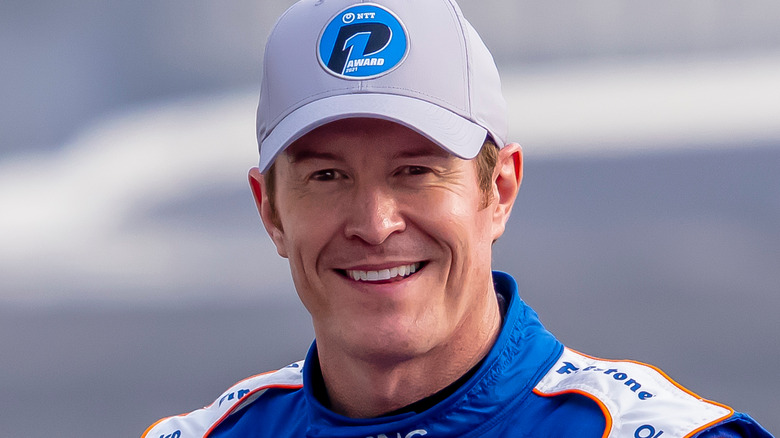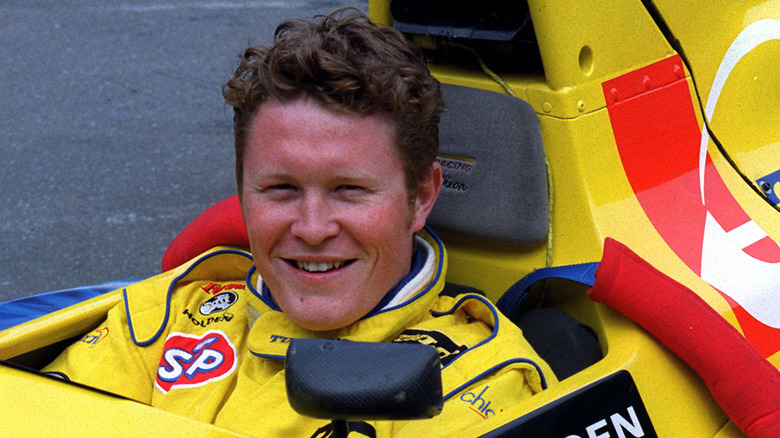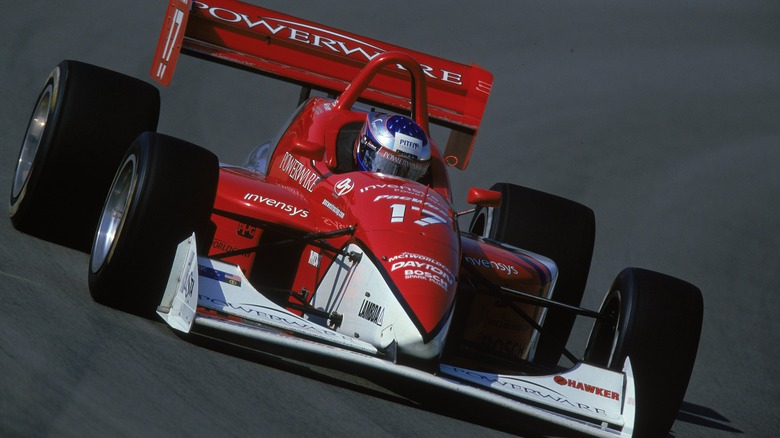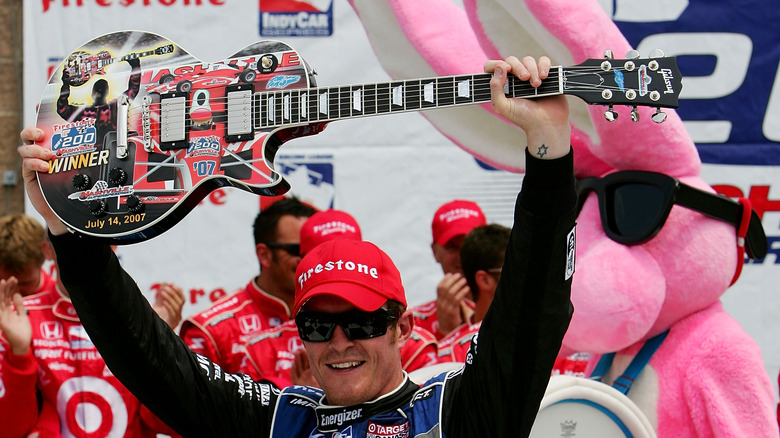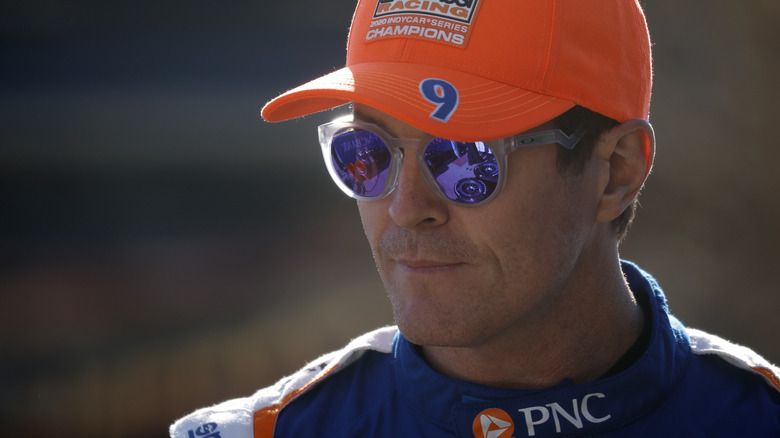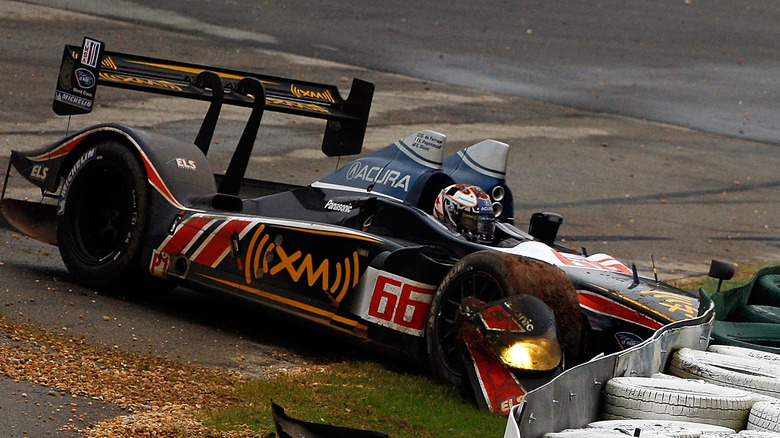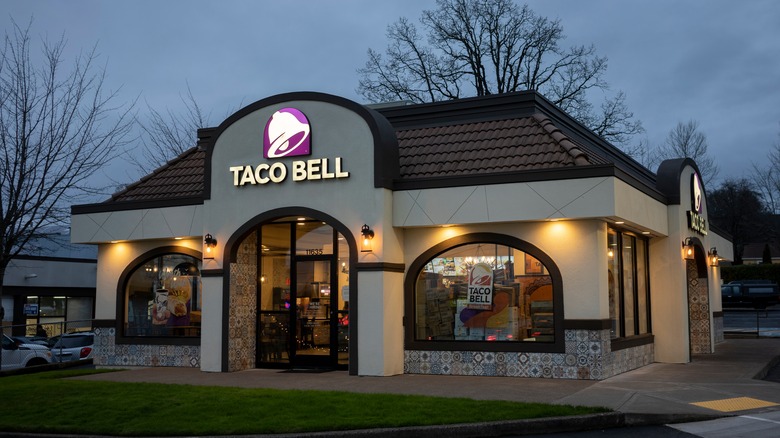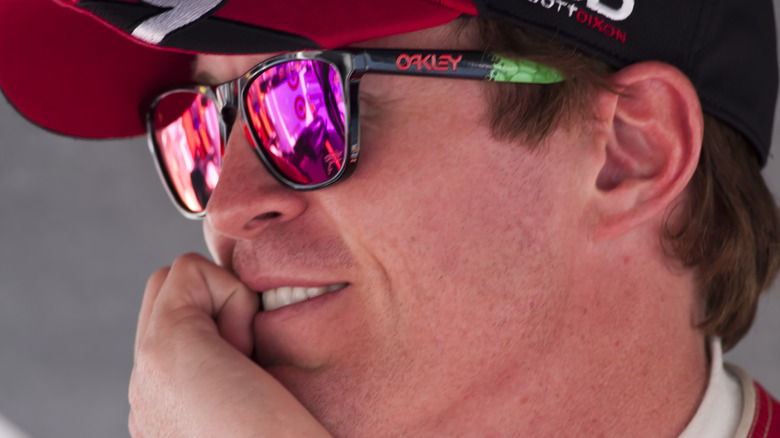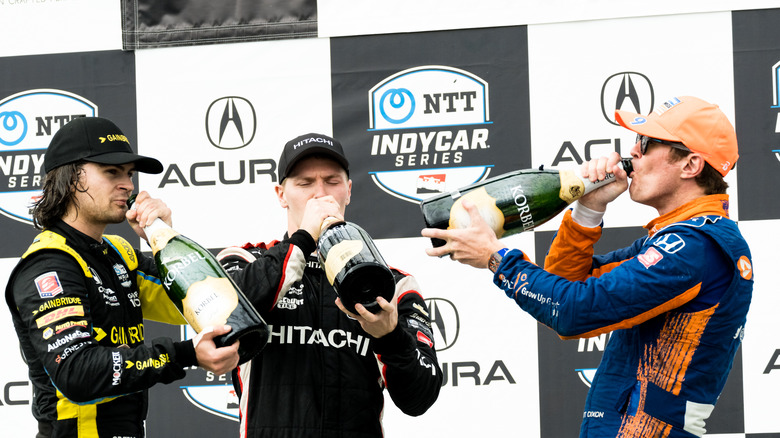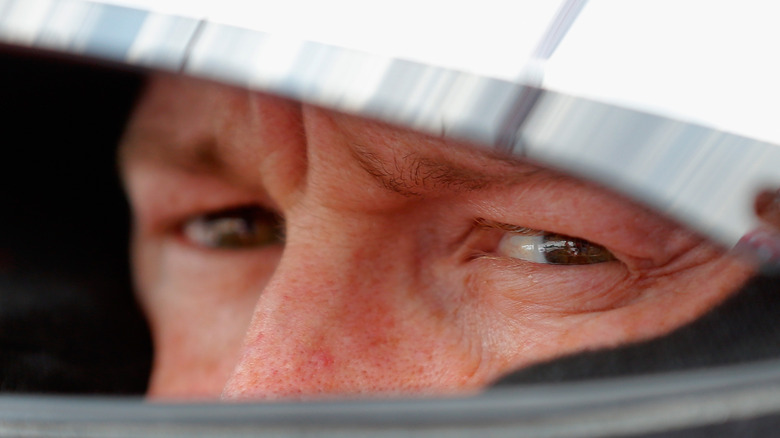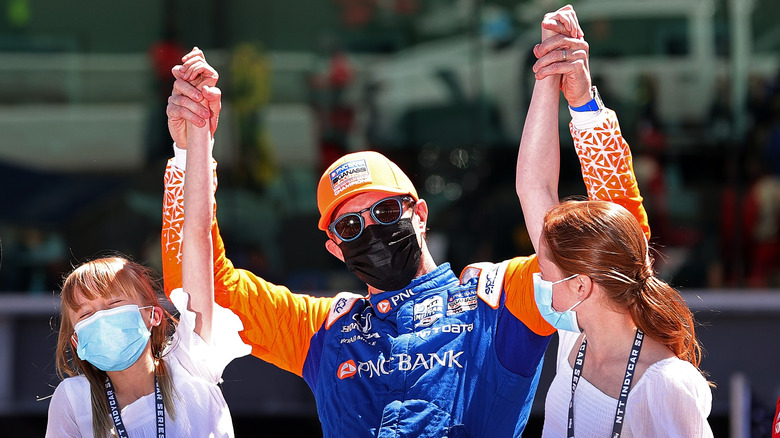The Untold Truth Of Scott Dixon
They've given the world legendary filmmakers, a coveted vacation destination, and the first mountaineer to reach the peak of Mt. Everest. And to the list of accomplishments by New Zealanders, you can add excellence in racecar driving, courtesy of Scott Dixon.
Behind the wheel since his teenage years, Dixon has maintained an irrepressible enthusiasm for his chosen sport. Formula Vee races in his native country and in Australia paved the way for a career in the legendary IndyCar Series in the United States. "I love racing," he declares on his official website. "I love being at the track. I love waking up thinking about it, training for it." That passion, a fierce competitive streak, and an unflappable professional demeanor that's won him the nickname "Iceman" (per ESPN) have brought Dixon six IndyCar championships (per IndyCar), victory in the Indianapolis 500 in 2008, and the third-place position on the IndyCar Series' all-time winner list.
The effort expended on such a storied career in any profession would inspire a share of fascinating stories, and Dixon's path to the big time has its own unique turns, so to speak. Let's take a look at some of his unsung triumphs and trials.
His first underage race was nearly a disaster
While born in Brisbane, Australia, according to Stuff, Scott Dixon spent most of his youth in Manurewa, South Auckland, in New Zealand (per Snap Lap). He was quick to catch the racing bug, though like any child so afflicted, he had to start small. Go-karts gave him his fix at age seven. Six years later, Dixon felt ready to step behind the wheel of a proper car. The only problem was that, even for competition, the minimum age for a road license in New Zealand was 15.
The 13-year-old's prowess in kart races had won him some admirers, however. For a one-weekend event at New Zealand's noted Pukekohe Raceway, Dixon was granted a special disposition to get behind the wheel of a Nissan Sentra (per the NZ Herald). It was the sort of opportunity many kids only dream of, but it nearly became a nightmare. Too short to reach the pedals unaided, Dixon worked the car with a pillow strapped to his back. He flipped over on a turn and was caught on New Zealand television scrambling out of the car, pillow still on.
As hairy as the accident was, it did Dixon no harm. In fact, it helped bring him to the attention of motorsport enthusiasts. Within the same year, Dixon competed in his first Formula Vee event, according to Motorsport.com – and won the very next season, still too young for a license.
Family connections and sacrifices built his early career
Scott Dixon's attraction to motor racing didn't come out of the blue. According to the Press Democrat, parents Ron and Glenys Dixon were both dirt-track racers. They even owned a small course in Australia before their son's birth. The family was more than happy to have their son take up their passion and excel in it, but by the time Dixon began racing cars, his parents were both working day jobs: Ron as a car dealer and Glenys in retail. They could not easily afford the heavy expenses car racing incurs. The family mortgaged the house until they couldn't do it anymore, Glenys told ESPN. Their son's optimism was so great that they couldn't put a damper on his ambitions.
Eventually, Dixon's talent attracted outside support in the person of Ken Smith, a former New Zealand racer whose connections got Dixon into competitions in Australia. But the flights to and from the continent – there on Thursdays, home for school Mondays – required his parents to solicit local companies and personal contacts to pay for the tickets. And when Dixon set out for the United States, his father turned to those same contacts for a more significant investment. Scott Dixon Motorsport, at $5,000 a share to 30 shareholders, saw Dixon across the Atlantic. When he made it big in the IndyCar Series, he bought out the company, got his early supporters $25,000 on their initial investment, and bought his parents a house.
He considered a career in golf at one point
Sure, Scott Dixon wanted to be a race car driver since he was a kid. And sure, his parents had a background in racing. But lots of kids dream about being a race car driver and never pursue it, nor enter the family business. Dixon's family had put the keys to their cars aside by the time they all settled in Auckland (per the Press Democrat). And kids go through so many dream jobs while growing up, playing at each without seriously pursuing them. They may try their hand at being a cowboy, or a soldier, or an astronaut – or a professional athlete. In an interview with The Athletic, Dixon admitted that another early passion of his besides cars was golf.
Of course, nothing makes a kid switch or abandon an obsession like getting a taste of it and finding it too hard. Dixon's early excursions behind the wheel were successful and led to bigger things, but golf was another story. Even though his family home was right by a golf course, he just couldn't get the hang of the game. "I had such a frustrating time with it that I've never really picked up a golf club since I was 15," Dixon told The Athletic. But even when he dabbled in the sport, it took a back seat to racing. And these days, he does go for a bit of fun at Top Golf every now and again.
He's a deliberately low-key celebrity
Racecar drivers aren't usually the most immediately recognizable of celebrities. Still, they are public figures, and within racing fan circles, you might expect that a record-breaking champion would be a familiar face. But driver Tony Kanaan related to The Athletic a time when he and Scott Dixon were approached at dinner by a fan who wanted a picture. Kanaan's picture, to be precise. The fan didn't recognize Dixon at all, and only asked that he take the photo. "[Dixon] just started laughing," said Kanaan. "He doesn't care [about celebrity]. He just doesn't. He's here to win races and that's it."
Anonymous is the way Dixon prefers to operate. While conceding the necessity of publicity, sponsorship, and fan interaction, he doesn't relish them, and he doesn't like having the spotlight shone only on the most famous member of a racing team. "I would rather the load be over five or six or seven people as opposed to just me," he told The Athletic, acknowledging the crews needed to maintain a driver. "It's never one person who makes it happen."
Even his native New Zealand doesn't treat him as a high-profile figure according to Stuff. As far as his private life is concerned, Dixon is a self-described minimalist. He lives in the suburbs of Indianapolis with his wife and kids, handles trips to school most days of the week, and keeps the flashy perks of success to a minimum.
He's taken the blows for his career
There are inherent risks to getting behind the wheel of a car for the daily commute, and considerably greater risks to racing cars at high speeds. There's at least one wreck per race according to the Bleacher Report, secondary dangers come from fumes and the long hours strapped in at high speeds, and more than one driver has lost their life. It's a fact Scott Dixon is well aware of. In his time on the circuit, he's had his share of close calls. A 2003 race in Japan left him with a fractured hand after he and a rival car crashed and flew into the outside wall of the track (per Motorsport.com). Luckily, it did not impede his participation in the Indianapolis 500 later that year.
A more serious crash came in 2017. According to the Detroit News, Dixon was sent into the air by an unavoidable collision with another car and came down on the inside wall. He managed to escape the crash with nothing worse than a fractured ankle, and he was able to go on with the race. But a documentary crew following Dixon for the film "Born Racer" (via Stuff) observed the strain the accident put on Dixon and his family. They've seen friends and colleagues lose their lives to racing, with family members left widowed and orphaned. After Dixon's crash, his wife Emma Davies-Dixon remarked: "I genuinely thought that was it. I thought that was my turn."
He was mugged at a Taco Bell
The high speeds, fast turns, and heavy competition of racecar driving all bring with them risk. But the ordinary streets hold their own dangers too, as Scott Dixon can attest. According to Fox 59, after competing in the 101st Indianapolis 500 in 2017, Dixon, his wife Emma Davies-Dixon, and fellow racers Dario Franchitti and Tony Kanaan decided to go out for dinner. Given the late hour, the only options available were drive-thru restaurants.
The group settled on a nearby Taco Bell. While waiting in the drive-thru lane, Dixon's car was approached by two young men armed with a gun. They thrust the weapon into the car window, took Davies-Dixon's purse, and ran off. Later that night, a suspicious vehicle previously picked up by the Taco Bell's surveillance camera was stopped by police. A passenger in the car attempted to escape but was stopped by a police dog. Taken into custody, he was identified by Dixon and his friends. Davies-Dixon's effects were recovered.
The press was quick to pick up the story. According to ESPN, the incident was, briefly, the first thing that came up in a Google search of Dixon's name. For his part, Dixon shared only minimal details of a then-ongoing investigation. It seems, however, that he took the robbery in stride. "Yesterday was fantastic, the whole day was fantastic, we went to bed super happy," he said the next day. And dinner was on the house.
Winning early threw him off
Success can bring on surprisingly complicated emotions. After achieving a goal long sought after, one has to wonder, "What comes next?" Scott Dixon found himself in that position in 2003. It was his very first year competing in the IndyCar Series, and he had a phenomenal debut. According to IndyStar, he picked up five pole positions and three wins, including the championship of that year.
As wonderful a start to his career in the IndyCar Series as that first season was, the aftermath threw Dixon for a loop. "Roughest two years of my life," was how he described it to The Athletic. "I was kind of thinking, 'Is this it? Is this where the story ends and you move on to the next chapter?'" It wasn't only a philosophical question. Such a strong start had him initially confident that the awards would keep on coming, but Dixon only won a single race in the next two years.
Dixon eventually rebounded from that mid-career slump. He now holds six IndyCar championships. On the occasion of winning his fifth, he told IndyStar that he'd come to see that period in his career after the first season as a lesson. "It made me really understand it's not easy," he said. "That [first win] came at a time when I didn't really respect it, and now that's certainly changed."
He's racked up the records
Tony Kanaan, a close friend of Scott Dixon's, once said of him (via The Athletic): "He HATES losing ... the more he wins, the more he wants to win." Dixon's won quite a lot with that mentality. His official website names him the most decorated active racer in the IndyCar Series with 51 victories. He's only one win behind the all-time second-place driver Mario Andretti, who has called Dixon "the benchmark" of the sport as it stands now. His stats include 183 finishes in the Top 5 of IndyCar races and 255 in the Top 10.
The records and awards under Dixon's name don't stop there. He picked up "Rookie of the Year" from the Australian Formula Holden Championship. His win at PacWest Racing in 2000 put him down as the second-youngest champion of the Indy Lights Series, and a victory in the Nazareth Speedway in 2001 at age 20 made him the youngest-ever winner of a CART (Championship Auto Racing Team) race. Dixon shows no signs of slowing down these days, literally or figuratively. In 2022, he ran two out of four qualifying laps for the Indianapolis 500 over 234 mph, the fastest pole speed ever according to Yahoo! Sports. And he holds a record of a more personal nature as well: his 21-year tenure with Chip Ganassi Racing is the longest for a driver and his team.
He hold high honors in his native country, too
Scott Dixon and his family have been based in Indianapolis since coming to the United States in the 1990s. His profile in his native New Zealand is "muted" outside the motorsport community, in the words of Stuff. When Dixon's young nieces wanted to attend a Justin Bieber concert in Auckland, and a radio station was offering tickets to whoever got the most famous New Zealander to call in, they asked their mother to ask their uncle to do them a favor. Famous uncle Scott Dixon was pressed into service, but when he finally got through, rugby player Sir Colin Meads was the voice on the other line. Dixon enjoyed the chance to speak with the legendary athlete, but he admitted to himself: "I've lost this for sure."
It shouldn't be thought that New Zealand doesn't honor its racing son, however, or that Dixon doesn't have pride in his homeland. Their Halberg Awards named Dixon the New Zealand Sportsman of the Year in 2008 and 2014 (per IndyCar.com). He was appointed a Member of the New Zealand Order of Merit in 2009. And 10 years later, that was stepped up to a Companion of the New Zealand Order of Merit (one grade up) on the honors list for Queen Elizabeth II's birthday (per the Seattle Times). If you've ever seen the letters CNZM after Dixon's name, that's where they come from.
He found a way to train for racing during COVID
Racecar driving is not the most physically active of sports, it has to be said. Drivers are strapped into their vehicles for hours at a time, so much so that there's a possible connection between the profession and blood clots (per the Bleacher Report). But fitness still matters to the racing game. In a regular season, a driver like Scott Dixon would make use of the facilities at PitFit Training in Indianapolis. Besides regular exercise, it's imperative that drivers train their reaction time through various tests and challenges.
In 2020, however, the state of Indiana entered into a statewide lockdown in response to the COVID-19 virus. Gyms, along with all other nonessential services, were shuttered. Dixon and his family took the restrictions seriously, according to NBC Sports, but he still wanted to keep himself sharp. The solution proved to be a simple one: Dixon's wife threw tennis balls at him. Or, rather, she would alternate the direction she threw or dropped tennis balls, substituting for the flashing light board and other advanced systems used to train reflexes at the gym. "Nothing is normal these days," Dixon said of the situation, but he enjoyed being home more regularly, and he had the equipment needed for basic cardio and other fitness needs along with the tennis balls.
